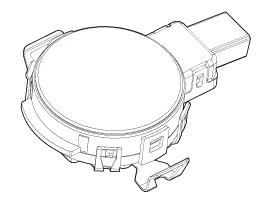Hyundai Genesis (DH): Windshield Wiper/Washer / Rain Sensor Description and Operation
| Description |
| Integrated Rain Sensor |
| 1. |
Wiper Control System
When "AUTO" switch signal is received from the multi-function
switch on the right, the integrated rain sensor detects the amount of
rainfall. The sensor is installed inside the upper part of the front
window for wiper motor control.
This system automatically controls the operation duration and
speed of the wiper depending on the measured amount of rainfall even if
the driver does not operate the wiper switch. |
| 2. |
Auto Light Control System
When "AUTO" signal is received from the multi-function switch
on the left, the integrated rain sensor installed on the front window
detects the brightness of the light and controls the operation of the
head lamp and screen brightness of the internal multimedia.
This system automatically controls the brightness of the head
lamp and the internal multimedia screen depending on the measured
brightness even if the driver does not operate the lamp switch. |
| 3. |
Central Air Conditioning System
When "AUTO" signal is received from the central air
conditioner switch, the integrated rain sensor detects the amount of
sunshine depending on the direction of the sunlight.
This system automatically controls the cooling system
depending on the measured amount of sunshine even if the driver does not
operate the air conditioner switch. |

| Functions and Operating Principles |
| 1. |
Detecting the amount of rainfall
The light (beam) emitted from light emitting diodes (LED) is
totally reflected on the external surface of the windshield and comes
back to the photo diodes. When there is water on the external surface of
the windshield, the light is optically separated and reflected
partially and the remaining brightness is measured by the photo diodes.
Water remaining on the windshield results in the light being not totally
reflected. The loss of brightness due to this indicates how much the
glass surface is wet. |
| 2. |
Detecting light
Brightness of light is measured by the diodes using the
infrared light. The brightness of the outside of the vehicle is measured
in two directions: (a) the upper direction and (b) the front direction.
The measured amount of light is used to determine whether it is day or
night. |
| 3. |
Detecting the amount of sunshine
The system measures the amount of sunshine from the left and
right sides and operates the air conditioner on the driver side or the
passenger side. |
Integrated rain sensor is composed of 2 LEDs and 2 photo
diodes to detect rainfall, 2 photo diodes to detect light, 1 photo diode
to detect the amount of sunshine, and bracket. |
| 1. |
When "AUTO" signal is received from the multi-function switch
on the right, the integrated rain sensor detects the rainfall and
controls the wiper motor. |
| 2. |
When |
Circuit Diagram
Removal The dust or foreign substance on the rain sensor has a bad effect upon the rain sensor capability, so protect the sensor surface with protection cover until installing the rain sensor to bracket for accurate function The coupling pad on the rain sensor surface has adhesive strength, so the coupling pad could stick to the windshield by environment condition during the using time.
Other information:
Hyundai Genesis (DH) 2013-2016 Service Manual: Description and Operation
System Overview RPAS (Rear Parking Assist System) is an electronic driving aid that warns the driver to be cautious while parking or driving at low speed. The sensor uses ultrasonic waves to detect objects within proximity of the vehicle. RPAS consists of four RPS sensors which are detecting the obstacles and transmit the result separat
Hyundai Genesis (DH) 2013-2016 Service Manual: Climate Control Air Filter Repair procedures
Replacement 1. Remove both stoppers (B) by turning them from the glove box (A). 2. Disconnect the air damper (A) from the glove box (B). 3. Remove the filter cover (A) by pressing the knob. 4. Replace the air filter (A) with a new one according to the direction of air filter.
Categories
- Manuals Home
- Hyundai Genesis Owners Manual
- Hyundai Genesis Service Manual
- Starter Repair procedures
- Steering System
- Engine Coolant Temperature Sensor (ECTS) Repair procedures
- New on site
- Most important about car

